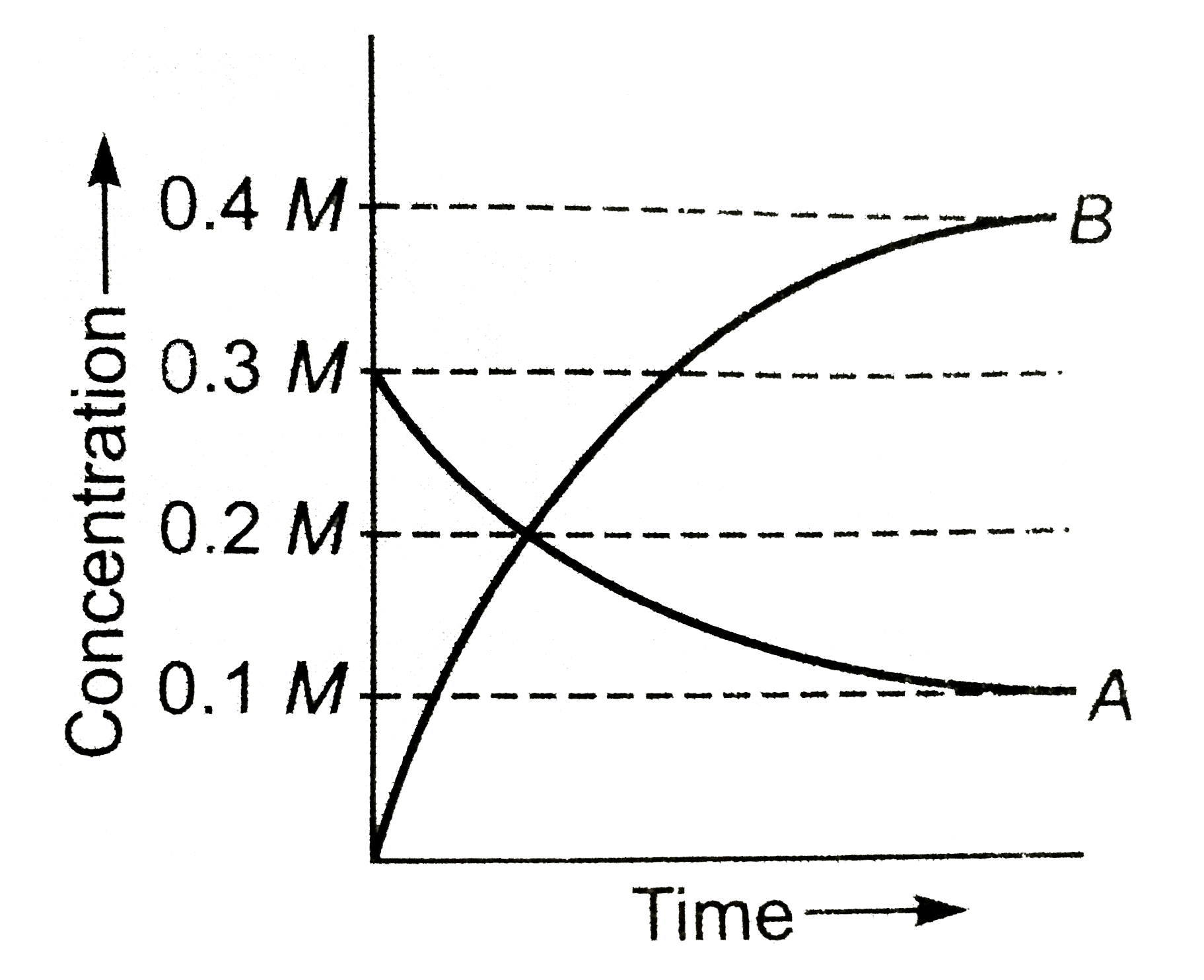The reaction,
2A(g)+B(g)⇔3C(g)+D(g)
is begun with the concentration of A and B both at an intial value of 1.00 M. When equilibrium is reached, the concentration of D is measured and found to be 0.25 M. The value for the equilibrium constant for this reaction is given by the expression:
[(0.75)3(0.25)]÷[(0.50)2(0.75)]
[(0.75)3(0.25)]÷[(0.50)2(0.25)]
[(0.75)3(0.25)]÷[(0.75)2(0.25)]
[(0.75)3(0.25)]÷[(1.00)2(1.00)]
The correct Answer is:A
To solve the problem, we will follow these steps:
Step 1: Write the balanced chemical equation
The balanced chemical equation is:
2A(g)+B(g)⇌3C(g)+D(g)
Step 2: Set up the initial concentrations
At the beginning of the reaction (t = 0), the concentrations of A and B are both given as:
(A)=1.00M
(B)=1.00M
The initial concentrations of C and D are both 0 M since the reaction has not started yet.
Step 3: Define the change in concentrations
Let x be the amount of B that reacts at equilibrium. According to the stoichiometry of the reaction:
- For every 2 moles of A that react, 1 mole of B reacts.
- For every x moles of B that react, 2x moles of A will react.
Thus, the changes in concentrations at equilibrium will be:
- For A: (A)=1.00−2x
- For B: (B)=1.00−x
- For C: (C)=3x
- For D: (D)=x
Step 4: Use the information given about D
We know from the problem that at equilibrium, the concentration of D is measured to be:
(D)=0.25M
This means:
x=0.25
Step 5: Calculate the equilibrium concentrations
Now we can substitute x=0.25 into the expressions for the equilibrium concentrations:
- For A:
(A)=1.00−2(0.25)=1.00−0.50=0.50M
- For B:
(B)=1.00−0.25=0.75M
- For C:
(C)=3(0.25)=0.75M
- For D:
(D)=0.25M (as given)
Step 6: Write the expression for the equilibrium constant
The equilibrium constant Kc for the reaction is given by:
Kc=(C)3(D)(A)2(B)
Step 7: Substitute the equilibrium concentrations into the expression
Now we can substitute the equilibrium concentrations into the expression:
Kc=(0.75)3(0.25)(0.50)2(0.75)
Step 8: Calculate the value of Kc
Calculating the numerator:
(0.75)3=0.421875
So,
0.421875×0.25=0.10546875
Calculating the denominator:
(0.50)2=0.25
So,
0.25×0.75=0.1875
Now, substituting back into the expression for Kc:
Kc=0.105468750.1875≈0.5625
Final Answer
Thus, the equilibrium constant Kc for the reaction is approximately:
Kc≈0.5625
---
The balanced chemical equation is:
2A(g)+B(g)⇌3C(g)+D(g)
At the beginning of the reaction (t = 0), the concentrations of A and B are both given as:
(A)=1.00M
(B)=1.00M
The initial concentrations of C and D are both 0 M since the reaction has not started yet.
Let x be the amount of B that reacts at equilibrium. According to the stoichiometry of the reaction:
- For every 2 moles of A that react, 1 mole of B reacts.
- For every x moles of B that react, 2x moles of A will react.
- For A: (A)=1.00−2x
- For B: (B)=1.00−x
- For C: (C)=3x
- For D: (D)=x
We know from the problem that at equilibrium, the concentration of D is measured to be:
(D)=0.25M
This means:
x=0.25
Now we can substitute x=0.25 into the expressions for the equilibrium concentrations:
- For A:
(A)=1.00−2(0.25)=1.00−0.50=0.50M
- For B:
(B)=1.00−0.25=0.75M
- For C:
(C)=3(0.25)=0.75M
- For D:
(D)=0.25M (as given)
The equilibrium constant Kc for the reaction is given by:
Kc=(C)3(D)(A)2(B)
Now we can substitute the equilibrium concentrations into the expression:
Kc=(0.75)3(0.25)(0.50)2(0.75)
Calculating the numerator:
(0.75)3=0.421875
So,
0.421875×0.25=0.10546875
(0.50)2=0.25
So,
0.25×0.75=0.1875
Kc=0.105468750.1875≈0.5625
Thus, the equilibrium constant Kc for the reaction is approximately:
Kc≈0.5625
Similar Questions
A reaction, A(g)+2B(g)⇔2C(g)+D(g) was studied using an initial concentraction of A and B were found to be equal. The value of KP for the equilibrium is
View SolutionA reaction, A(g)+2B(g)⇔2C(g)+D(g) was studied using an initial concentraction of B which was 1.5 times that of A. But the equilibrium concentrations of A and B were found to be equal. The vlue of Kp for the equilibrium is
View SolutionFor the reaction, A(g)+2B(g)⇔2C(g) one mole of A and 1.5 mol of B are taken in a 2.0 L vessel. At equilibrium, the concentration of C was found to be 0.35 M. The equilibrium constant (Kc) of the reaction would be
View SolutionFor the reaction A+B⇔C+D, the initial concentrations of A and B are equal. The equilibrium concentration of C is two times the equilibrium concentration of A. The value of equilibrium constant is ………..
View SolutionThe figure shows the change in concentration of species A and B as a function of time.
The equilibrium constant Kcfor the reactionA(g)⇔2B(g) is :

View SolutionThe reaction A+B⇔C+D is studied in a one litre vessel at 250∘C . The initial concentration of A was 3n and that of B was n. When equilibrium was attained, equilibrium concentration of C was found to the equal to the equilibrium concentration of B. What is the concentration of D at equilibrium ?
View SolutionIn a chemical reaction , A+2BK⇐⇒2c+D, the initial concentration of B was 1.5 times of the concentrations of A , but the equilibrium concentrations of A and B were found to be equal . The equilibrium constant (K) for the aforesaid chemical reaction is :
View SolutionIn a chemical reaction , A+2BK⇐⇒2c+D, the initial concentration of B was 1.5 times of the concentrations of A , but the equilibrium concentrations of A and B were found to be equal . The equilibrium constant (K) for the aforesaid chemical reaction is :
View SolutionA+B⇔C+D. If finally the concentrations of A and B are both equal but at equilibrium concentration of D will be twice of that of A then what will be the equilibrium constant of reaction.
View SolutionIn the reaction A+B⇔C+D , What will happen to the equilibrium if concentration of A is increased ?
View Solution
